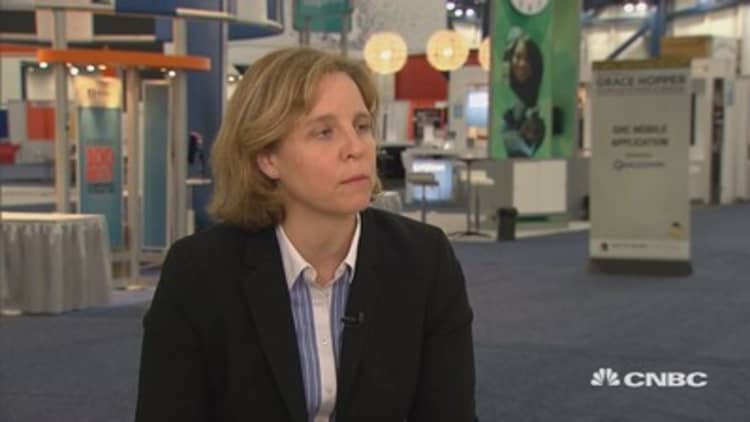
The United States' chief technology officer, Megan Smith, took the stage at one of the largest gatherings of women in technology — the Grace Hopper Celebration of Women in Computing.
She made the trip to the convention in Houston, where 12,000 women in technical fields are gathering, as she works to recruit more women in technology to work for the government.
She's hired over 200 people from Facebook, Amazon, Google, and other Internet and tech giants in the past year.
Improving the number of women at tech jobs is not just good for women, it's also key to growing the economy, Smith said.
"This is a huge problem for our country. We have over a half-million jobs open right now in the United States in tech. ... They're in all different industries, in manufacturing, in retail, in health care, et cetera, and so we need more people to train. What's interesting about the tech jobs is they pay 50 percent more than the average American private-sector salary. They're incredibly attractive but supply and demand's not working," she said.
To address the issue, her team is promoting TechHire, its multisector initiative to help Americans gain the skills they need through universities, community colleges, "coding boot camps" and online courses. But perhaps the biggest challenge is a cultural one — an unconscious bias against women. "People when they're interviewing, they're like 'you are like me,' they're sort of pattern-mapping a certain group and then assuming another group doesn't want to come in."
There's also the issue that women aren't represented as leaders in the field, which she's trying to address by promoting the history of women at the forefront of computer science.
"Through the '80s women used to be 40 percent of the computer science industry at IBM and Intel and all the early companies. It has dropped to the teens. And it's because during the '80s as the personal computer industry started we sort of said these are for our boys and husbands," said Smith. "So we want to make sure we shift off the bias."
One way the White House is hoping to help is by working with the private sector to get leaders to commit to making changes: leading workshops focused on how to get women in the pipeline, how to help women advance and break through to the C-suite, and how to address cultural bias. She's particularly interested in addressing the venture capital industry, where only 3 percent of V.C.-backed companies are led by women and only 1 percent are led by African-Americans. "We want to make sure everybody's getting access to this venture capital money, because everyone's starting companies, but you need that growth money to really lift it."
But she's optimistic about the work that companies are doing to address the issue. In addition to training management to be aware of bias, she said "people are actually writing software to try to support that."
She's also hopeful about the initiatives that various companies are taking. She points to Intel's goal to make its workforce match the American public in five years, and Cisco's commitment to improve its female ratio, which is progressing ahead of plan. She also noted that Microsoft, Xerox, and Pinterest have signed on to the Rooney Rule, the NFL's commitment to interview a diverse range of candidates for senior positions.




